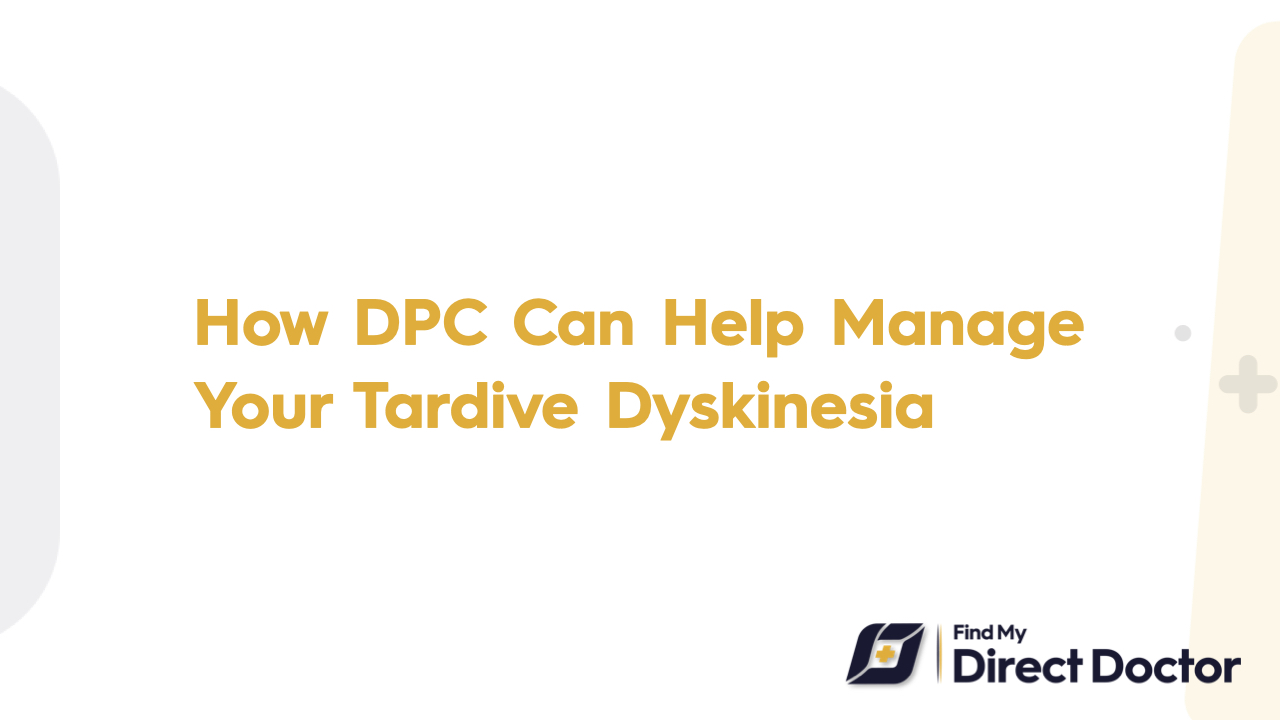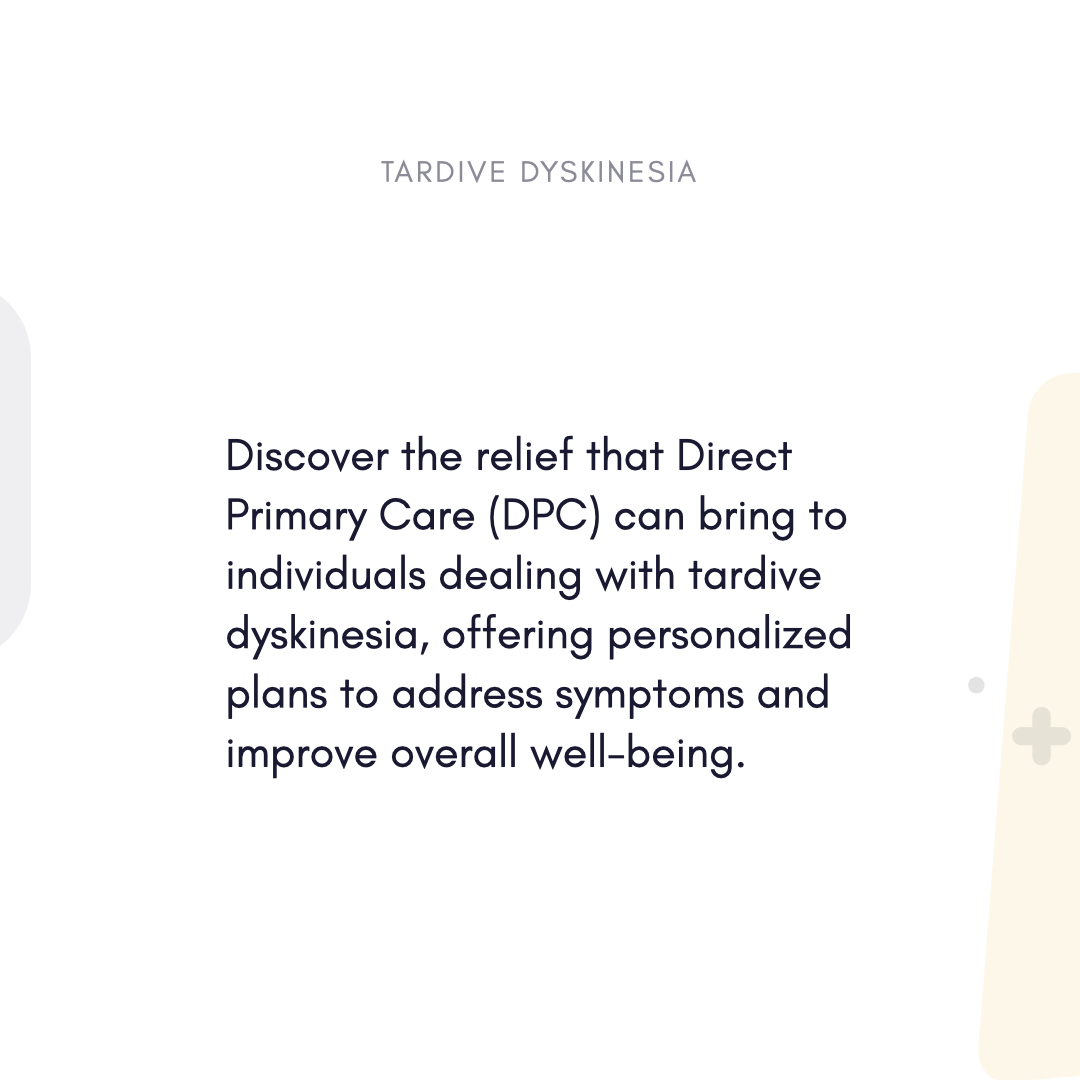Tardive Dyskinesia and Direct Primary Care (DPC): Personalized Care for Involuntary Movements
You know the physical and psychological toll of tardive dyskinesia (TD) if you have ever felt your face twitch uncontrollably, your limbs move without direction, or battled clear speech due repeated tongue thrusting. Usually brought on by long-term antipsychotic use, this neurological condition afflicts 500,000 Americans. Direct Primary Care (DPC), which combines timely interventions, cost transparency, and techniques to reclaim control of your body, offers a compassionate, patient-centered method of TD management, though.

Tardive Dyskinesia: Understanding Its Effects
Dopamine receptor blockade from drugs like these defines TD by forced, repeated motions:
- Haloperidol, risperidone: antipsychotics.
- One of the antiemetics is metoclopramide.
- Amitriptyline is the antidepressant (rarely).
Typical signs include:
- Tongue protrusion, lip smacking, and facial grimacing.
- Fast blinking, finger gestures, or toe tapping.
- Pelvic push or trunk rocking.
Long-term hazards of unmanaged TD:
- Persistent movement disorders.
- Social isolation, despair, or anxiety.
- Trouble swallowing or talking.
DPC Changes Things TD Attention
Under the membership model known as Direct Primary Care (DPC), patients pay a monthly fee—usually 50 USD–150 USD—for unlimited access to their main care physician. For TD patients, this entails no surprise bills, no waiting months for specialist referrals, and treatment focused on minimising symptoms and drug side effects.
Here's why DPC distinguishes itself:
1. Prompt, Guideline-Based Diagnosis
DPC doctors apply American Psychiatric Association guidelines including:
- Frequent AIMS evaluations: during med checks, using the Abnormal Involuntary Movement Scale.
- Medication reviews help to identify TD-triggering medications and, when feasible, deprescribing.
- Early intervention: Writing VMAT2 inhibitors—valbenazine—to slow down motions.
2. Reasonably priced, holistic treatment
- By providing generic alternatives (such as vitamin E, amantadine) at wholesale rates, DPC clinics help to lower costs.
- Giving brand-name VMAT2 inhibitors cash-pay discounts.
- Organizing inexpensive physical therapy for movement retraining.
3. Ongoing Support for Standard of Living
- Having 24/7 access to your DPC doctor allows you to change medications should new symptoms develop or TD aggravation results.
- Get mental health tools for depression or anxiety connected to TD.
- Look at alternative treatments (such botulinum toxin for focal dystonia).
DPC Benefits for TD Patients
Customized Treatment Plans
- Each visit, DPC doctors spend 30 to 60 minutes developing plans including:
- Dose optimization: Slowly lowering antipsychotics under observation of mental health.
- Modifications in lifestyle: yoga, meditation, stress-reducing strategies help to reduce tics.
- Diet high in antioxidants could help to possibly slow down development.
Savings on Cost
- Not one co-pay for regular AIMS assessments.
- Valbenazine at 300 USD a month against 1,500 USD+ with insurance.
- Proactive symptom control helps to avoid ER visits.
Coordination across several disciplines
DPC doctors:
- Quickly refer to psychiatrists or neurologists as needed.
- Bargain for deep brain stimulation consults on cash rates.
- Share treatment histories to stop unnecessary tests.
Success Stories from Real Life
- Case 1: After her DPC doctor switched Linda from haloperidol to a newer antipsychotic and added valbenazine, 58-year-Linda cut her TD facial grimacing by 70%.
- Case 2: James, 45, kept his teaching job by avoiding 10,000 USD in specialist fees when his DPC clinic managed his TD with vitamin E and amantadine.
FAQs on Tardive Dyskinesia and DPC
- Q: Is it possible to undo TD?
- A: Early intervention may stop development. DPC emphasizes on early symptom detection by frequent tests.
- Q: DPC seems reasonable for ongoing TD treatment.
- A: Absolutely. Members avoid expensive specialist co-pays and save thirty to fifty percent on drugs.
- Q: What should I do if I need a neurologist?
- A: A DPC physician often arranges consultations with self-pay discounts and simplifies referrals.
Why DPC Is a Win for TD Patients: Why
Early recognition and multidisciplinary treatment are stressed by the National Organization for Rare Diseases (NORD). DPC offers this via:
- Setting screens as a top priority stopping permanent TD by regular AIMS inspections.
- Empowering individuals: Medication risks and symptom tracking education.
- Simplifying treatment: One monthly payment pays for unlimited calls, visits, and care coordination.
Recover Your Movements Using DPC
Tardive dyskinesia need not rule your life. Every twitch, every change, every step forward—your dignity and autonomy—you find a partner with DPC who listens, innovates, and prioritises these things.






